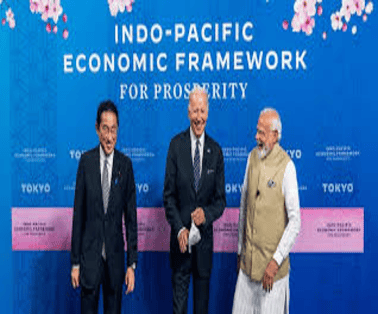The Indo Pacific Economic Framework (IPEF) for Prosperity is set to host the Clean Economy Investor Forum in Singapore from 5th to 6th June 2024, bringing together global investors and climate-tech innovators across member countries.
Key Points
- The IPEF Clean Economy Investor Forum is one of the initiatives under the IPEF, which was launched in May 2022.
- The Forum aims to mobilise investments into sustainable infrastructure, climate technology and renewable energy projects.
- It will provide a platform for climate tech entrepreneurs and companies in India to recognise the top climate tech companies and start-ups among the member countries and present them to global investors.
- The Department of Commerce is the nodal agency for the IPEF engagements, and the IPEF Clean Economy Investor Forum is managed by Invest India, India’s National Investment Promotion Agency.
What is the Indo Pacific Economic Framework?
- It is a US-led initiative that aims to strengthen economic partnership among participating countries to enhance resilience, sustainability, inclusiveness, economic growth, fairness, and competitiveness in the Indo-Pacific region.
Country Partners
- Australia,
- Brunei,
- Darussalam
- Fiji,
- India,
- Indonesia,
- Japan,
- Republic of Korea,
- Malaysia,
- New Zealand,
- the Philippines,
- Singapore,
- the United States
- Thailand, and
- Vietnam
Four Pillars of the Indo Pacific Economic Framework
Unlike traditional trade blocs, IPEF won’t negotiate tariffs or market access, and the framework will focus on integrating partner countries in four areas which include:
- Trade:
- It intends to build high-standard, inclusive, free, and fair-trade commitments and develop new and creative approaches in trade and technology policy that advance a broad set of objectives that fuels economic activity and investment, promotes sustainable and inclusive economic growth, and benefits workers and consumers.
- Collaboration in the digital economy is one of the initiatives, but it is not the only one.
- Supply Chains:
- IPEF is committed to improving transparency, diversity, security, and sustainability in supply chains to make them more resilient and well-integrated.
- To coordinate crisis response measures; expand cooperation to better prepare for and mitigate the effects of disruptions to better ensure business continuity; improve logistical efficiency and support; and ensure access to key raw and processed materials, semiconductors, critical minerals, and clean energy technology.
- Clean Energy, Decarbonization, and Infrastructure:
- In line with the Paris Agreement goals and efforts to support the livelihood of peoples and workers, it plans to accelerate the development and deployment of clean energy technologies to decarbonize our economies and build resilience to climate impacts.
- This also involves deepening cooperation on technologies, on mobilizing finance, including concessional finance, and on seeking ways to improve competitiveness and enhance connectivity by supporting the development of sustainable and durable infrastructure and by providing technical assistance.
- Tax and Anti-Corruption:
- It is committed to promoting fair competition by enacting and enforcing effective and robust tax, anti-money laundering, and anti-bribery regimes in line with existing multilateral obligations, standards, and agreements to curb tax evasion and corruption in the Indo-Pacific region.
- This involves sharing expertise and seeking ways to support the capacity building necessary to advance accountable and transparent systems.
Flexibility in Participation
- Countries have the liberty to join any module without all of them being binding. This arrangement was reportedly worked out as India, and some other nations had reservations about joining the framework.
- How this works is that developments in one module, for example, supply chain resilience, can move forward even as the whole IPEF is fleshed out and introduced later.
Why Was IPEF Created?
- The IPEF is also seen as a means by which the US is trying to regain credibility in the region after former President Donald Trump pulled out of the Trans Pacific Partnership TPP).
- Since then, there has been concern over the absence of a credible US economic and trade strategy to counter China’s economic influence in the region.
- China is an influential member of the TPP, and has sought membership of its successor agreement Comprehensive and Progressive Agreement on Trans Pacific Partnership.
- It is also in Regional Comprehensive Economic Partnership, of which the US is not a member (India withdrew from RCEP).
- The Biden Administration is projecting IPEF as the new US vehicle for re-engagement with East Asia and South East Asia.
To Download Monthly Current Affairs PDF Click here
Click here to get a free demo
Discover all about CLAT Exam



